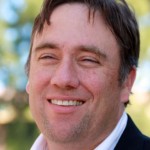Opinion: Can Calif. adopt Korea’s nuclear cool?
By Joe Mathews
Can Californians learn to be as cool as Koreans in the face of nuclear annihilation?
Visiting Seoul this month, I asked people how they stay sane while living within range of North Korea’s weapons. Kim Jong Un’s capital, Pyongyang, is 120 miles from Seoul—the same small distance protecting San Diego from Los Angeles.

Joe Mathews
Of course, South Koreans have been living productively under North Korea’s threats for six decades. For Californians, being North Korean targets is disorientingly new—because of the regime’s advances in nuclear warheads and intercontinental ballistic missiles.
North Korean propaganda has sown fears with specific threats against California and even animations of nuking San Francisco. The L.A.-area Joint Regional Intelligence Center last summer urged state and local officials to update nuclear attack response plans.
Talking to Seoul locals eased my nuclear jitters. “Keep calm and drink beer,” I was advised, in an alcohol-friendly Korean twist on the World War II-era British advice to “Keep calm and carry on.”
Indeed, the deepest worries I heard from South Koreans involved the reliability of President Trump, and whether he was truly committed to honoring the longstanding ironclad American commitment to protect South Korea even if it risked an attack on the United States. The North Korean escalation—through nuclear and missile tests—is often seen as posing a question to the United States: “Are you willing to trade Los Angeles for Seoul?”
But that question, while frighteningly linking the fates of California and Korea, is seen as mostly rhetorical in Seoul, a city so vital that its destruction is unthinkable.
Instead, South Koreans see the current conflict cynically—as a contest between a dictator, Kim Jong Un, and a reality TV-authoritarian, President Trump, who both use threats to rile people up and preserve their power—which they, in turn, use to enhance their personal wealth. One Korean scholar, boasting that his country had impeached its own corrupt president, Park Geun-hye, in March, asked me if the United States might do the same.
Rather than give in to authoritarian madness, locals say, it’s better to behave nonchalantly. That’s what South Korea’s new president Moon Jae-In did when he went on vacation after a North Korean missile test last summer. The news media reinforces such sanguinity; last week, stories about Korea’s business world, rising housing prices, and the upcoming Winter Olympic Games here in February got more notice than the possibility of a nuclear exchange. During a daylong conference I attended on the future of Korean democracy, North Korea got mentioned exactly once.
Yes, South Koreans are making defensive preparations, and discussing the possibility of acquiring their own nuclear weapons. In August, the government conducted a large-scale civil defense drill. And I met a few Koreans who admitted to keeping bags packed with the same items—cash, identification, water, food, first-aid—that Californians assemble in their own earthquake kits.
One afternoon, I had coffee with Leif-Eric Easley, who grew up in Long Beach and lives with his family in Seoul, where he is a professor at Ewha University. An expert on international relations and Northeast Asia, Easley argues that North Korea’s provocations are meant to divide its neighbors, so not rising to the bait is a good strategic response.
Easley says that Koreans stay cool in the face of threats because they understand the situation well, and knowledge reduces fear. But the risk of war is not zero, and he sees a certain desensitization to the war threat. After North Korea’s nuclear test in September, the parks were so full of Koreans enjoying good weather and beer that his family found it hard to find a place to picnic.
After our conversation, I walked by the U.S. Embassy, where I encountered competing protests—one a “No Trump Zone” that called
for the pursuit of peace with the North, and the removal from South Korea of an American missile defense system known as THAAD (Terminal High Altitude Area Defense).
The smaller counter-protest urged a pre-emptive American strike on the North: “You Bomb North Korea. We Support You.”
Both protests were tiny compared to two nearby events. Several hundred Koreans, mostly in their 20s, were attending a job fair, a familiar scene in a wealthy country struggling with high youth unemployment. And a short walk away, in Gwanghwamun Plaza, thousands of young people gathered to watch a rehearsal for an upcoming Olympic-themed concert by the K-pop group Twice.
The nine young women in the group were singing their huge hit, “Cheer Up.” It’s about dealing with an anxious boyfriend who keeps texting his love, escalating in desperation to something that might sound threatening.
But the chorus offers some good advice, to girlfriends and Californians alike: Stay cool and keep the relationship alive. “I’ll act calm,” Twice sings, “as if it’s nothing.”
Joe Mathews writes the Connecting California column for Zócalo Public Square.


